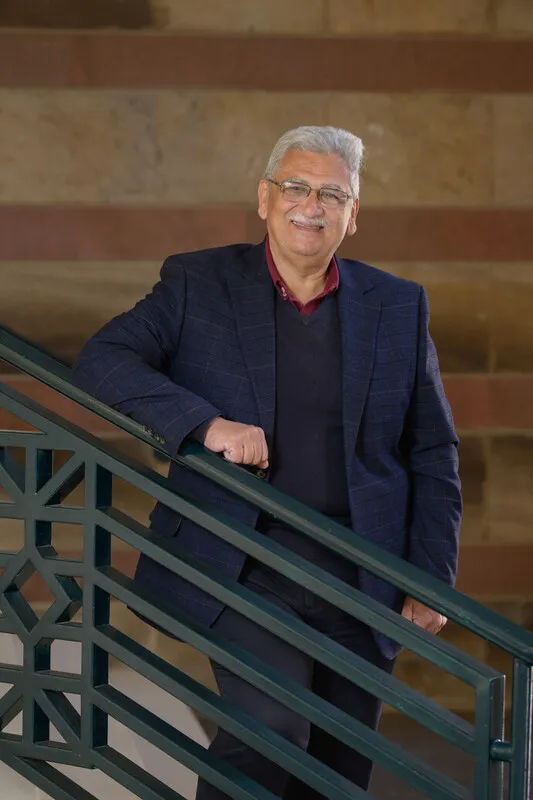Amid the ongoing reform of Egypt's healthcare system, Hesham Dinana, assistant professor in AUC's Department of Journalism and Mass Communication, and alumni researchers -- in collaboration with the London School of Economics and the Ministry of Health and Population -- are coming up with a framework to advance healthcare across the country. Their 2024 report, Sustainability and Resilience in the Egyptian Health System, identifies areas for improvement and outlines recommendations aimed to upgrade governance, boost financing and streamline digitization.
AUCToday sat down with Dinana to learn more about Egypt's healthcare landscape and what the upcoming reforms may bring.
How would you describe the current state of Egypt's healthcare system?
Egypt's healthcare system has made progress over the years,
but it still faces challenges, particularly in terms of access and affordability. A key issue is healthcare financing; many families face severe financial hardship when dealing with serious illnesses.
What are the main challenges in healthcare financing?
Right now, the biggest difficulty is ensuring that Egypt's new universal health insurance system can be rolled out without putting too much financial pressure on families or the government. As we scale the system, we need to make sure it's stable enough to cover costs, especially for chronic and catastrophic illnesses like cancer or diabetes, which can financially ruin even well-off families.
What would you say is the most exciting part of Egypt's healthcare reform right now?

We're seeing rapid changes in how healthcare is delivered, especially with the integration of technology. The use of data and AI in healthcare is still relatively new in Egypt, but it's an area with great potential. Many hospitals and clinics now use electronic health records, and initiatives like e-health are on the rise. But the challenge lies in how we leverage that data to make informed decisions that improve patient outcomes.
Can you provide an example of how using data could improve healthcare outcomes in Egypt?
Take cancer care as an example. A few years ago, most people from Upper Egypt had to travel to Cairo or Alexandria to get proper cancer treatment, which was incredibly difficult for many families. But when we started tracking the data, we realized the need to open comprehensive cancer treatment center in Luxor. Doing this has significantly reduced the burden on patients in that region. This kind of data-driven decision making can make healthcare more efficient and equitable.
What other areas of healthcare could benefit from data-driven approaches?
Almost every area could benefit, but outcomes-based healthcare is particularly important. Instead of focusing solely on the number of services provided, we need to look at the results those services produce. For example, instead of just counting
how many surgeries were performed, we should assess how many of those surgeries led to successful recoveries. This shift in mindset will help the healthcare system evolve to focus on patient health, not just treatment.
What steps is Egypt taking to promote preventive care?
The healthcare system is slowly moving toward a focus on wellness and prevention. We're seeing more initiatives aimed at promoting healthy lifestyles, which are essential for reducing the burden on hospitals.
This includes public health campaigns to combat issues like smoking and obesity. It's a shift from the traditional mindset of only treating people when they're already ill.
What do you see as the long-term impact of these reforms on the healthcare workforce?
There will be a significant demand for new types of healthcare professionals, particularly in areas like health informatics and medical technology. Universities are starting to offer specialized programs to meet this demand, which is promising for the future. This shift will also
create more job opportunities in the sector, particularly for technicians and data specialists.
What do you hope the Egyptian healthcare system will look like in 10 years?
I'd like to see a more resilient system that can quickly adapt to new challenges, whether that's another pandemic or a rise in chronic diseases. I hope it achieves the three As of world-class performance: accessible, affordable and accredited. The system should be flexible, financially stable and data-driven, as well as focused on value and outcomes to ensure sustainability and resilience.
What inspired you to get involved in healthcare?
I wanted to make a difference in people's lives, and healthcare is one of the few fields where you can see the direct impact of your work. When I returned to Egypt from the United States after working as a biomedical engineer for 10 years, I had the opportunity to help develop the Children's Cancer Hospital 57357, and that experience showed me how much of a difference we could make. I've been committed to improving healthcare ever since.
-By Devon Murray


